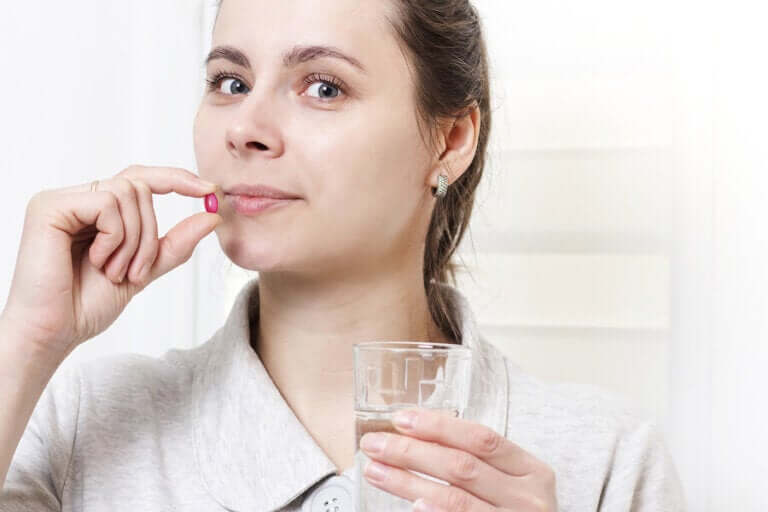The Placebo Effect of Food

The placebo effect of food is a new research topic. In fact, researchers are realizing that foods can be health or disease factors. Although what we eat influences our well-being or pain, the truth is that there are also fantasies that influence this.
There are foods that people promote as if they were magical. With others, people mention certain specific effects that impact a certain area of health or organ. Therefore, they seem to work well in certain people.
Those effects, miraculous or only partly helpful, are what made us start talking about the placebo effect of food. Is it possible that something happens with food, just like placebo drugs? Let’s see.
The placebo effect

We have known about the placebo effect since 1800, thanks to British doctor John Haygarth. Since then, specialists have been using it systematically. In fact, they use it both in testing new drugs, and as treatments themselves. This effect happens when someone takes a pill, thinking its a medication. However, it’s not a real medication, even though the person sees an improvement.
For example, nowadays we know that expensive placebos are more effective than cheap placebos. In fact, even if it’s a sugar pill, it’s more effective if it’s expensive. Likewise, researchers have found that red pills have better effects than blue ones.
For a long time, people considered the placebo effect to be a result of suggestion or “false medicine.” However, recently, and with the help of modern tools, studies show that placebo really generates positive changes in the brain. Additionally, this helps people heal.
Also read: Five Questions about Generic Drugs
Research on the placebo effect with food
The placebo effect with food is a newer area of research. One of its pioneers is Dr. Alia Crum, clinical psychologist and researcher at Columbia Business School. One of her most famous experiments has to do with calorie intake.
A group of volunteers was told they would drink a 640-calorie milkshake. Another group was told that the calorie volume in the milkshake was 140. However, both milkshakes were the same, and actually had 340 calories. Those who drank the milkshake thinking it was high in calories felt full quickly. However, the other group started to feel hungry.
Other similar research showed that people can even lose or gain weight from a similar situation. These other studies show that there might be a placebo effect with food. The belief that food will cause a certain effect influences people so much that this effect happens.
The strength of the placebo effect

Advances in research on the placebo effect with food have shown fascinating results in recent years. One of the most interesting findings is that this effect isn’t just psychological. In fact, it acts at the biochemical and molecular level.
In one of the most recent world conferences on the placebo effect, held in Leiden, Germany, they showed MRI images. They showed that there are areas of the brain that activate from taking a sugar pill if the doctor suggests it’s a medication.
You might be interested: 5 Foods for Healthier Blood and a Happy Body
Kathryn T. Hall, molecular biologist, along with Ted J. Kaptchuk, head of the Placebo Studies Program at Harvard Medical School, are two of the most advanced scientists on the subject. Their research states:
Mutations in an enzyme called catecholmrthyltransferase (COMT), determine higher or lower levels of response to the placebo effect.
Effects on diet
We are still far from fully understanding the placebo effect. Typically, in drug experiments, placebos work in a third of volunteers. This means that it does have real power. However, researchers still have lots more to discover.
As for the placebo effect on food, it means that for humans, food is not just a sum of substances eaten. There’s something symbolic about eating. Therefore, people have lots of different beliefs and emotions about it.
For the same reason, as Dr. Alia Crum demonstrates, the effect that food has on our bodies depends a lot on beliefs on certain foods. If we think it’ll hurt us, it probably will. Additionally, the same happens the other way round. Everything indicates that the placebo effect does work with food.
All cited sources were thoroughly reviewed by our team to ensure their quality, reliability, currency, and validity. The bibliography of this article was considered reliable and of academic or scientific accuracy.
- Finniss DG, Kaptchuk TJ, Miller F, Benedetti F. Biological, clinical, and ethical advances of placebo effects. Lancet. 2010;375(9715):686–695. doi:10.1016/S0140-6736(09)61706-2
- Ordi HG., El empleo de la técnica de sugestión e hipnósis en el control y reducción del dolor: implicaciones para la psicooncología. Psicooncologia, 2005.
- Potthoff, J., Jurinec, N., & Schienle, A. (2019). Placebo Effects on Visual Food Cue Reactivity: An Eye-Tracking Investigation. Frontiers in Psychiatry, 10. https://doi.org/10.3389/fpsyt.2019.00525
- Hall KT, Loscalzo J, Kaptchuk TJ. Genetics and the placebo effect: the placebome. Trends Mol Med. 2015;21(5):285–294. doi:10.1016/j.molmed.2015.02.009
This text is provided for informational purposes only and does not replace consultation with a professional. If in doubt, consult your specialist.








